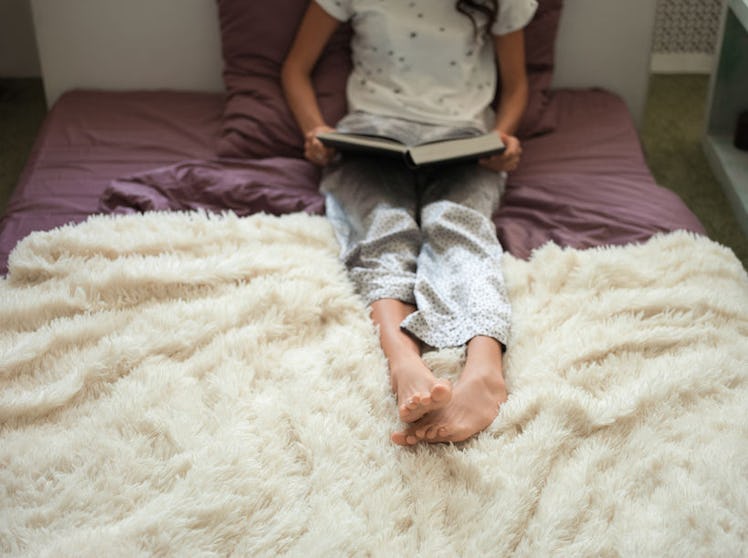
Here's What Experts Want You To Know About Taking Benadryl For Sleep Instead Of Allergies
There’s arguably no feeling more euphoric than when you take a dose of medicine that sends you off to snoozeville in minutes flat after nights of sniffling, sneezing, and zero sleep. Over-the-counter meds like Benadryl do you right in that sense, but guys, unless you’re experiencing heinous allergies that ruthlessly keep you up at night, it’s bad to take Benadryl for sleep for a plethora of reasons — the first and foremost being that Benadryl isn’t even advertised as a sleep aid. That sleep-inducing drowsiness you know and bask in is a side effect of the medication that, BTW, is really only meant to treat allergic reactions. Sorry not sorry, but it’s just not the same thing, friends.
Look, I’ve been there; I’ve had plenty of nights where sleep either didn’t come easily, or it didn't come at all, and it sucks. But I can honestly say that while I’ve taken melatonin to fall asleep more easily, and sipped on a mug full of warm milk to simmer my body down a little bit, browsing through my medicine cabinet for any sense of relief has never crossed my mind. Evidently that’s a good thing, because according to Robert Glatter, M.D., an assistant professor of emergency medicine at Lenox Hill Hospital, Northwell Health, Benadryl can have some scary side effects that just aren’t worth the risk.
Even when used at the recommended dosage, Glatter says that taking Benadryl can potentially lead to side effects like “elevated heart rate, anxiety, sedation, nausea, blurred vision, dry mouth, difficulty urinating, and constipation.” Personally, I’d rather pull an all-nighter. And again, that’s if you adhere to the dosage on the bottle. Take anymore than your doctor or the box deems necessary, and Glatter tells Elite Daily you could be at risk of irregular heartbeats, seizures, and excessive sedation. Um, no thank you.
Still, some people are willing to risk developing these side effects for the sake of a good night’s sleep, and that’s because the medication’s active ingredient, diphenhydramine, can put you out like a light. But here’s the thing: Benadryl is an antihistamine, Dr. Gina Lynem-Walker, a physician consultant for Blue Cross Blue Shield of Michigan, tells Elite Daily, and histamines are compounds that play a role in how your immune system responds to injury, or ingestion of a potentially dangerous foreign substance.
An antihistamine, from what I understand, makes it so that your body doesn’t totally freak out, and puts it in a drowsy state so the medicine can work its magic. In the process, however, antihistamines can actually interrupt your healthy sleep cycle. Ergo, you might clock in eight hours of shut-eye after taking Benadryl, but it won’t necessarily be the high-quality sleep you’re looking for.
“Drugs like Benadryl can block acetylcholine, a neurotransmitter that aids in REM sleep,” Dr. Lynem-Walker explains. “This means that by taking Benadryl, your body will have a harder time falling into a deep sleep that allows you to wake up feeling well-rested.” Seems to me like you’d be better off napping to make up for lost sleep instead.
So, should you rely on Benadryl to help you sleep? No. Can you take Benadryl to help you sleep? You can, but it definitely shouldn’t be your first line of defense against lack of sleep. Glatter tells Elite Daily that, once in a blue moon, if you’re really struggling to fall asleep, it is safe to take Benadryl. However, taking it shouldn’t be part of your nightly routine because a) you’ll put your health at risk, and b) your body can actually develop a tolerance for the medication pretty quickly, so in a matter of days, it wouldn’t be all that effective.
Instead, Rob Bent, co-founder and chief product officer of Som Sleep, suggests leaning on more natural supplements like magnesium, vitamin B6, and even melatonin to normalize your sleep cycle if you feel like something is off. "These compounds, which can help the body's natural sleep-wake processes operate as smoothly and efficiently as possible," Bent tells Elite Daily, "are an effective solution for many dealing with sleep issues, especially when combined with proper sleep hygiene practices."
Translation: Skip the meds, and go the all-natural route. It'll be more beneficial in the long run — for your sleep patterns, and your overall health.